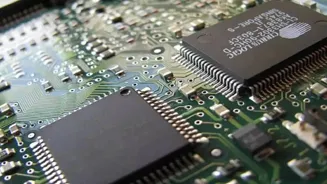In a major push to the government’s Make in India and Atmanirbhar Bharat initiatives, the Union Cabinet has approved four new semiconductor manufacturing
projects under the India Semiconductor Mission (ISM), attracting a cumulative investment of around Rs 4,600 crore. The announcement marks a significant expansion of India’s domestic chip-making capabilities and paves the way for new technology, jobs, and industrial growth. These newly sanctioned projects will establish India’s first commercial compound semiconductor fabrication facility and an advanced glass-based substrate packaging unit, alongside other manufacturing capacities. The government said the approvals will “substantially strengthen” the country’s semiconductor ecosystem, which is critical for sectors like telecom, automotive, consumer electronics, industrial electronics, data centres, and defence.
The Four Approved Proposals
The fresh clearances have gone to SiCSem, Continental Device India Private Limited (CDIL), 3D Glass Solutions Inc., and Advanced System in Package (ASIP) Technologies. Once operational, these facilities are expected to create direct employment for 2,034 skilled professionals and stimulate indirect jobs in the wider electronics manufacturing supply chain.Following these approvals, the total number of projects under ISM rises to 10, with combined investments of about Rs 1.60 lakh crore spread across six states.
State-Wise Projects
- Odisha:
- SiCSem – In partnership with the UK’s Clas-SiC Wafer Fab Ltd, this plant in Bhubaneshwar’s Info Valley will produce Silicon Carbide (SiC) devices. It is designed to manufacture 60,000 wafers annually and package 96 million units, catering to sectors like defence equipment, EVs, fast chargers, solar inverters, railways, and consumer appliances.
- 3D Glass Solutions Inc. (3DGS) – Also in Info Valley, this facility will introduce advanced packaging and embedded glass substrate technology to India. Production targets include 69,600 glass panel substrates, 50 million assembled units, and 13,200 3D Heterogeneous Integration modules, for applications in AI, RF, photonics, co-packaged optics, and high-performance computing.
- SiCSem – In partnership with the UK’s Clas-SiC Wafer Fab Ltd, this plant in Bhubaneshwar’s Info Valley will produce Silicon Carbide (SiC) devices. It is designed to manufacture 60,000 wafers annually and package 96 million units, catering to sectors like defence equipment, EVs, fast chargers, solar inverters, railways, and consumer appliances.
- Andhra Pradesh:
- ASIP Technologies – In collaboration with South Korea’s APACT Co. Ltd, ASIP will produce 96 million semiconductor units annually, for use in mobile devices, automotive components, set-top boxes, and consumer electronics.
- ASIP Technologies – In collaboration with South Korea’s APACT Co. Ltd, ASIP will produce 96 million semiconductor units annually, for use in mobile devices, automotive components, set-top boxes, and consumer electronics.
- Punjab:
- Continental Device India (CDIL) – A brownfield expansion in Mohali to enhance production of high-power discrete semiconductors such as MOSFETs, IGBTs, Schottky bypass diodes, and transistors using both silicon and silicon carbide. The upgraded facility will target 158.38 million units annually for applications in EV charging infrastructure, renewable energy, industrial power conversion, and communications.
- Continental Device India (CDIL) – A brownfield expansion in Mohali to enhance production of high-power discrete semiconductors such as MOSFETs, IGBTs, Schottky bypass diodes, and transistors using both silicon and silicon carbide. The upgraded facility will target 158.38 million units annually for applications in EV charging infrastructure, renewable energy, industrial power conversion, and communications.
Part of a Bigger Vision
These developments come as part of the India Semiconductor Mission, which aims to reduce the country’s dependence on imported chips and establish India as a global manufacturing hub. Already, six earlier projects are at various stages of implementation.The government has also been strengthening chip design capabilities through support to 278 academic institutions and 72 start-ups, enabling a talent pipeline for the industry.
With rising global demand for chips , driven by AI, EV adoption, high-performance computing, and next-gen telecom , securing domestic manufacturing is seen as crucial for economic and strategic security. The addition of advanced facilities in Odisha, Punjab, and Andhra Pradesh is expected to diversify India’s semiconductor production base, increase exports, and enhance resilience against global supply chain disruptions.
Industry experts note that such initiatives could also attract foreign partnerships and technology transfers, giving India a stronger position in the international semiconductor market over the next decade.





















